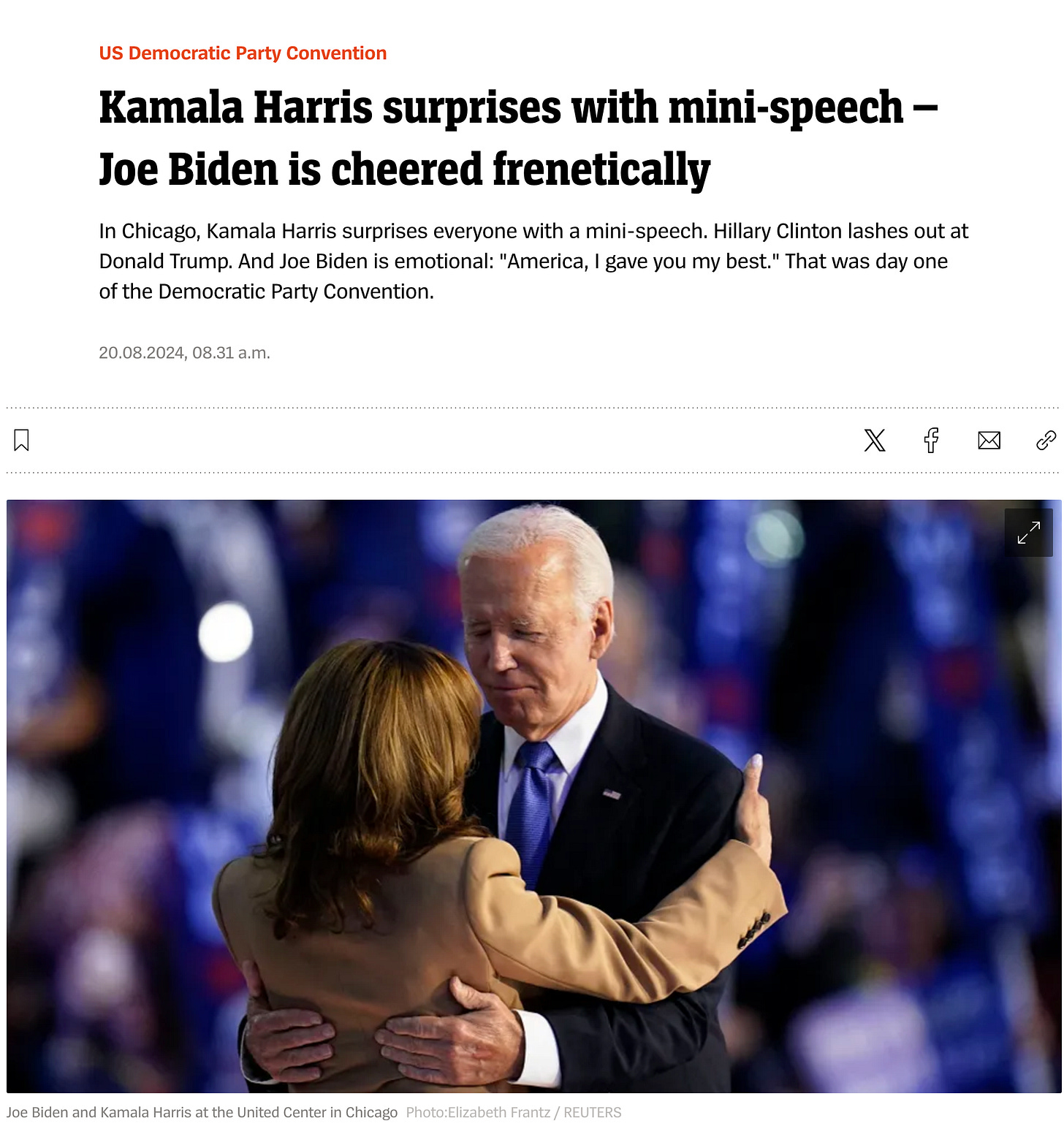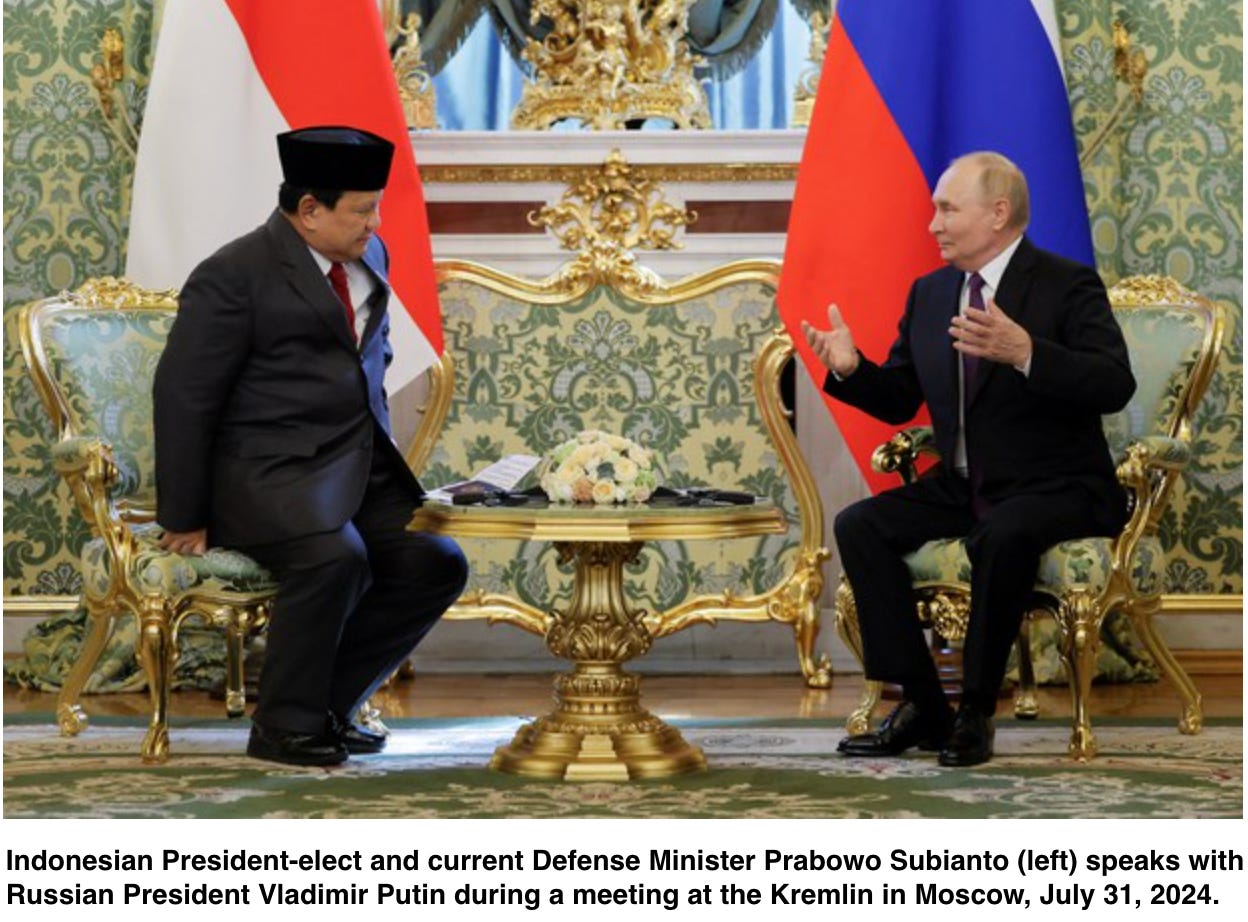TWTW: The World This Week #105
The election campaign heard 'round the world … forming up on Gaza … Russia on its back feet? … The Goat Life shocks Saudis & the world …cartoonist Chappatte on a new 'special military op'
In this weekly feature for Andelman Unleashed, we continue to explore how the media of other nations are reporting and commenting on the United States, and how they are viewing the rest of the world.
Elections 2024: America
The view from abroad
The world is starting to pay attention, indeed the stakes beyond America's shores are suddenly coming into stark relief abroad as the final stage of this epiphanic election campaign kicks off. If there was any doubt, here's what some of the world's greatest media are telling their readers and viewers:
France
Kamala Harris wants to embody a reconciled and optimistic United States
And inside Le Monde, pages 2 and 3, from correspondents Arnaud Leparmentier in Chicago and Piotr Smolar in Washington…
Harris, singer of a reconciled and optimistic America…
Kamala Harris, the democratic bet to defeat Donald Trump
The withdrawal of Joe Biden has propelled his vice president into the race for the White House. The candidate has renewed hope for her party, gathered this week in Chicago.
And then the p. 1 commentary from Philippe Gélie, deputy editor-in-chief of Le Figaro, the leading center-right French daily:
Whether you love or hate Donald Trump, you can easily imagine the direction the United States would take if he were elected. The former senator, for her part, gives off an impression of opportunism.
With its decorum, its prime-time pomp and its unanimity, the Democratic Party convention in Chicago must serve as a launching pad for the duo formed by Kamala Harris and her running mate, Tim Walz. The campaign will be short, barely eleven weeks, in the wake of the upheavals of the summer that saw the sidelining of the valetudinarian Joe Biden
Beware, however, of the euphoria of the in-crowd. Kamala Harris has proposed a range of economic measures with a strong populist whiff to raise the standard of living of the middle class, hard hit by two years of galloping inflation. The sycophantic Governor Walz hit the mark with a few poisoned arrows against the "weird" Republican tandem.
But the Democratic pair lacks a vision for the future for Americans. Ms. Harris bears the heavy handicap of being a Democrat from California, the state of all woke excesses. However, the decisive battle will take place in a few counties of “middle America.” It is up to her to convince voters that she can be a president of the middle ground, progressive on individual rights, moderate in her economic choices, liberal in terms of regulations. Otherwise, her main electoral argument will remain… Donald Trump.
Britain
Poland
For now, at least, Harris is doing better than expected. She’s striking the right notes at rallies. She’s managed to generate enthusiasm that’s sometimes compared to Barack Obama's 2008 presidential bid . Polls show she’s begun to rebuild the multigenerational, multiethnic, and liberal-leftist coalition that’s delivered a string of recent victories for the Democrats. And the party’s politicians have closed ranks, putting aside personal ambitions (or rather, understanding that to fulfill them, they now have to support Harris).
Tim Walz's choice for vice president was probably a success. Josh Shapiro, favored by bookmakers, had many advantages: a great speaker, a charismatic politician, governor of Pennsylvania, which is very important for the election results. However, Harris did not follow the path of least resistance. Walz brought a joviality and naturalness to the campaign, which suited both left-wing and centrist voters.
Germany
Der Spiegel
Spain & Latin America
El País
"Hope is back": Barack and Michelle Obama appoint Kamala Harris as their political heir
Italy
US Democrats The ovation for the president who will leave. Hillary Clinton: We haven't won yet
Harris, Obama's push
Barack's speech in Chicago. Biden: 'Kamala my best choice’
Israel
Haaretz
Hong Kong
China
And then there's RFK Jr….
As the Swiss daily Neue Zürcher Zeitung Washington correspondent Christian Weisflog reported:
Finally, back to Paris …
…where, as Le Parisien declares:
Nothing's decided
The two camps, opposed on everything, have formed up their forces for the American presidential election which will take place in a little more than 70 days. Between now and then, anything is possible.
How others see the World
Hope springs eternal
So, it's back to Cairo for what seems to be an eternal search for some peace in the Middle East and hostage exchange…as the Israeli daily Times of Israel put it:
Competitor Haaretz suggested delegations this time are of the highest order:
An Israeli delegation led by Mossad chief David Barnea will leave for Cairo on Sunday to continue negotiations for a cease-fire deal that would release the hostages held in Gaza. The summit will be attended by CIA director William Burns, U.S. envoy to the Middle East Brett McGurk, Qatari Prime Minister Sheikh Mohammed bin Abdulrahman Al Thani and head of Egyptian intelligence Abbas Kamel.
The Israeli delegation will include Shin Bet chief Ronen Bar and head of the Missing and Captive Soldiers Division in the IDF, Maj. Gen. (res.) Nitzan Alon.
But more brass is headed to the region in hopes of preventing a broader war, as Haaretz continued:
Air Force General C.Q. Brown, chairman of the Joint Chiefs of Staff, began an unannounced visit to the Middle East on Saturday to discuss ways to avoid any new escalation in tensions that could spiral into a broader conflict. He began his trip in Jordan and said he will also travel to Egypt and Israel in the coming days to hear the perspectives of military leaders.
His visit comes as the United States is trying to clinch an elusive Gaza cease-fire-for-hostages deal between Israel and Hamas, which Brown said would "help bring down the temperature," if achieved. "At the same time, as I talk to my counterparts, what are the things we can do to deter any type of broader escalation and ensure we're taking all the appropriate steps to (avoid) ... a broader conflict," Brown said before landing in Jordan.
And from the White House press office:
President Biden spoke [Friday] with President Abdel-Fattah El Sisi of Egypt. They discussed the urgency of bringing the ceasefire and hostage release deal to closure under the comprehensive bridging proposal that is now in the table, which would free the hostages, bring life-saving relief to Palestinian civilians in Gaza, and de-escalate regional tensions. They discussed upcoming talks in Cairo and efforts to remove any remaining obstacles to the deal. The President thanked President El Sisi for his leadership.
Meanwhile, war on the Lebanese front seems to have been avoided, for the moment. As Haaretz reported on Sunday:
Hezbollah's statement on Sunday, that the attack planned for Sunday has been concluded, ostensibly indicates that the most dangerous part of the present escalation between it and Israel is over. That assessment is bolstered by the Israeli Home Front Command's announcement, issued at midday, that constraints imposed in northern and central Israel have been lifted. The Hezbollah attack was thwarted for the most part thanks to Israel carrying out a preemptive strike. The group did manage to fire hundreds of rockets at northern Israel, but the damage they caused was quite limited.
And in that other war ….
The Ukrainian advance into Russia proceeds, apparently unchecked. In the past week, maps of the authoritative Institute for the Study of War [ISW] show just how Ukrainian forces are expanding the territory they now control inside Russia:
Ukrainian officials say they are making effective use of western weaponry that continues to flow, despite still vastly superior Russian forces. As ISW reported:
Ukrainian officials continue to highlight how Ukrainian forces can leverage tactical and technological advantages to offset Russian materiel advantages. Ukrainian First Deputy Defense Minister Lieutenant General Ivan Havrylyuk stated in an interview with Ukrainian outlet Ukrinform that the Ukrainian military has been able to inflict heavy losses against significantly larger quantities of Russian armored vehicles, artillery, and other equipment due to Ukrainian tactics and Ukraine's effective use of available weapons.
But especially shocking is a series of satellite images showing is ISW’s assessment of how Russia is desperately repositioning its weaponry out of range of US-backed weapons.
As ISW continued:
Ukrainian long-range strikes against Russian military targets within Russia’s rear are crucial for degrading Russian military capabilities throughout the theater, and the lifting of restrictions on Ukraine's use of Western-provided weapons would allow Ukrainian forces to strike a wide range of significant targets undergirding Russia’s war effort….Russian forces are leveraging sanctuary space in deep rear areas within Russia for a wide array of infrastructure besides airfields to support military operations against Ukraine.
ISW assesses that there are at least 250 military and paramilitary objects in Russia within range of ATACMS missiles that the United States has provided Ukraine. The United States currently prohibits Ukrainian forces from using ATACMS missiles to strike military targets in Russia—at maximum permitting Ukraine to strike only 20 out of the 250 objects it could strike with ATACMS. Only 17 of these 250 objects are airfields, and it is unlikely that the Russian military has redeployed assets away from all the other 233 objects to the same degree as it has reportedly done with aviation assets.
ISW’s map demonstrates this stunningly:
Control-of-terrain assessments are as of May … but current maps (above)— showing terrain seized by the Ukrainian invasion of Russia—might suggest another solution!
At the same time, Russia is looking, indeed quite far afield, about how to maintain and expand its numerical and technological advantages, especially with drones, while circumventing western sanctions that clearly do still bite. Though the visit of an Indonesian leader took place last month, some details just seem to be coming to light. As Pravda reported:
Indonesia, Asia's "young tiger", wants to buy military technologies from Russia in exchange for microchip and microcircuit production technologies. This was discussed at the summit in Moscow.
The visit of Indonesian President-elect and Defense Minister Prabowo Subianto to Moscow has been one of the most important news on Russia's foreign policy agenda these days. The visit began with a meeting on the level of defense ministries. It should be noted that Subianto served as Indonesia's Defense Minister under President Joko Widodo, so he has the required experience.
Military cooperation covers various aspects: from the exchange of military technologies to joint exercises. Indonesia wants to revisit its plans to purchase Russian weapons worth a total of $850 million. In particular, it is interested in Sukhoi fighter aircraft. Indonesia is an experienced user of Russian fighters. The island nation already operates Su-27 and Su-30 fighter jets.
Indonesia to help Russia with advanced electronics technologies
"We consider Russia a great friend of Indonesia and I would like to continue to develop relations with your country," the president-elect said in Moscow. According to him, Indonesia is ready to attract Russian investment into the country's economy. Russia may benefit greatly from it.
And then there's India …
Also apparently seeking to play two ends against the middle. As the Polish daily Wyborcza (which keeps a close eye on its neighbors) pointed out:
India, whose Prime Minister Narendra Modi has just visited Warsaw, is also playing on two fronts. Modi is conducting rotational diplomacy—a moment earlier he was in Moscow, today he is in Kiev.
It was the first visit to Poland by an Indian politician of this rank in 45 years….And what about the war in Ukraine? "The Prime Minister of India has confirmed his readiness to personally engage in a peaceful, just, and quick end to the war," said [Polish] Prime Minister Donald Tusk after meeting with Modi.
"I doubt that Polish encouragement and conciliatory gestures will have any significance here," writes Michał Olszewski, head of the foreign department of Wyborcza, without illusions. "The brutal truth is: India is at the top of the list of countries that may not support the war, but are also doing nothing to end it."
An Unleashed First !
Andelman Unleashed has unleashed new, paid tiers.
On Friday, for our (lightly) paid subscribers, we’d ordinarily be offering our fifth Unleashed Conversation via Zoom….
1 PM US eastern time / 7 pm Paris, Europe, Africa
10 am in San Francisco / Later in Asia
A campfire of the mind
But we are taking this coming Friday off (as is most of the universe) and we'll be back after that with a surprise!
So DO sign up…you’ll get a link…and we’ll have fun … but bring your own smores.
And then there’s … The Goat Life
A new film from Netflix and Bollywood is shaking up Saudi Arabia and much of the Middle East. It's called The Goat Life and tells the appalling story of a young Indian man who travels to Saudi Arabia with utterly horrific consequences. Wafaa Farouk of Raseef 22, the Beirut-based Arabic website picks up the story:
The 3-hour film addresses a contentious issue: the plight of migrant workers in Gulf countries. The movie is based on the true story of an Indian citizen who traveled to Saudi Arabia—Najeeb Muhammad, a simple young man from Kerala who dreams of going abroad to secure a better future for his unborn child. Najeeb and his younger brother struggle to gather the money needed to obtain a visa for a Gulf country.
After much hardship, they manage to secure jobs with a Saudi company, and their life seemed like a rosy dream—until they arrive at Jeddah Airport. Here, their lives take a dramatic turn when Najeeb is kidnaped, his sponsor, or ‘kafeel’, forces him to live alone in the desert, with only goats for company…his cruelty knowing no bounds. Over time, Najeeb becomes one of the goats, losing all sense of emotion, time, even the desire to speak or think. This isolation takes a toll on his memory and speech, and the film follows his harrowing journey until he miraculously escapes after three years of suffering.
For the trailer: click here…..
Although the film has been available on Netflix for a month, the Saudi backlash only began a few days ago, following the recent addition of Arabic subtitles, which brought the movie to the attention of Gulf audiences. The film’s significant success and the global debate it sparked also turned the Arab world’s, particularly Saudi Arabia’s, attention toward the film.
The Indian writer Benyamin published the full story titled, “Goat Days” in 2008…recounting many of the inhumane situations he endured for three years, including sleeping next to 700 goats, having no clothes other than what he was wearing, being denied access to water for bathing or basic needs, and being given nothing but bread and onions to eat. He was also constantly tortured, and his official documents were destroyed to prevent him from escaping the endless desert, as he described it.
Several Indian organizations took up Najeeb’s case, and after the film’s release, campaigns were launched to monitor abuses against Indian workers worldwide and to establish laws to protect these workers both financially and mentally.
This is not to say that there are not equally appalling stories in America. There is the chilling case of Peruvian sheep herders, imported (legally) into Colorado, then effectively enslaved as recounted by Teresa Cotsirilos in the award-winning piece for High Country News:
The Goat Life shows that inhumanity to man may not be confined to any single culture ... but each must own up to it and the Saudis rarely have. Moreover, in the American cases there were advocates ready and willing to go to bat for the Peruvian sheepherders when they managed to escape to tell their story.
Finally, there’s …. Chappatte
As for the Ukrainian incursion into the Kursk region of Russia adjacent to its frontier, the great Swiss cartoonist Chappatte imagines the first tanks, carrying the flag "free Ukraine," encountering the first Russians, hands raised in surrender as the Ukrainian commander announces: "Just a special military operation," borrowing the phrase coined by Vladimir Putin for his invasion of Ukraine, whose usage he then mandated, on pain of death or imprisonment, to refer to the two-year-long war he's waged and still failed to win.
Patrick Chappatte, who draws under his last name, is the son of a Swiss father and Lebanese mother and was last featured in Andelman Unleashed on July 6, imagining forces holding up a democratic Republic. Born in 1967 in Karachi, Pakistan, he began working for Swiss newspapers, currently dividing his time between Geneva and Los Angeles. He draws regularly for the Geneva daily Le Temps as well as Zurich’s Neue Zürcher Zeitung and frequently for Le Monde in Paris. In 2012 he became the first non-American to win the Thomas Nast Award of the Overseas Press Club of America. And with the Le Monde cartoonist Plantu he founded the inestimable Cartooning for Peace collective.
Here’s how Chappatte imagines himself:




























ooooh, you are SO right, Gabriella … indeed more so than in Hungary … SUCH a truly tragic situation !
SO true, but out here in remote NE Pennsylvania, this is still very much a tossup in what may well be THE critical vote !!